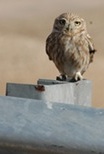I recently did some poetry workshops at The Jerusalem School of Beit Hanina, in East Jerusalem. The school’s motto is “Peace begins with me,” and my workshops coincided with Peace Days at the school. For that occasion, I wrote this poem, which I’m posting now on the last day of National Poetry Month. The students wrote some very wonderful poems about peace during the workshop—I’m waiting to see if I may publish them. If so, I will post them here at a later date.
Overlook

Athena Owl along the Alon Road, Israel
Along the Alon road near
where we once glimpsed
an Athena owl, the road
widens for cars to rest.
The look-out holds two old
olive trees together, friends.
New maps show new divisions.
Old maps recall old boundaries.
Stone fences, barbed wire
come and go. Land mines
lay sleeping. But the olive
branches don’t see these.
Standing guard by the road,
the two see open land: valleys,
wadis, and fields from here
to Jordan‘s distant mountains
and beyond—slow-moving possibility
.













Truly, we don’t talk enough about poetry, but I also enjoy conversation when we give it free-range.
LikeLike
Here’s to more poetic(s) and free-ranging conversations.
LikeLike
I agree. I was only pointing out the ironic similarity of their philosophical conclusion. In another irony the only place in the Middle East where Jews and Arabs live together in relative peace is the situation in Israel with its Arab citizens. Not that there are not problems, concerns about discrimination, etc. but relatively speaking that is the best actual example that exists.
BTW is makes sense that “alon” means “live oak” because that tree is known to have some of the hardest wood. The USS Constitution, “Old Ironsides” was built largely of live oak and confounded the British cannons.
LikeLike
That is an interesting and ironic observation, Ben. Thank you very much for a lively conversation!
LikeLike
The ambiguity of the last line is a reflection of the reality, even as you clearly wish for something else. As such, it is terrific.
LikeLike
TY for your comments and praise, Ben. Yes, the road is named for Yigal Alon, who offered Jordan, I think, a peace deal that would have allowed a Palestinian state essentially along the lines of what the Palestinians want–something like the 1967 borders if I recall correctly.
I see more of a difference between Kahan’s racist expulsions and a 2-state solution. While you make a point about an apparent separation, the demographic reality is that there are many Israeli Arabs, citizens and not living in the Occupied Territories. There is also the hot-button question of right of return for Palestinians to Israel. Politically and socio-economically, many Israeli Arabs likely would stay in Israel.
And while there is THE CONFLICT, Jews and Arabs get along every day in many settings, on the street, as individuals. Many do not, of course. But the 2 states allow a possibility. In all likelihood, that solution also would include people and goods crossing the borders–labor to Israel, goods to Palestine.
In these ways, I think, the 2 state solution differs dramatically from Kahan’s ideas. It allows for commerce, communication, and even living together–if in a limited way.
I didn’t know that about Alon’s name originally being Pikowitz or his cousin. I also like that Alon also means oak (live oak, I think), which also adds some dimension to the poem, I suppose.
LikeLike
I like “Overlook” very much, but if I can ask—doesn’t the ending imply the possibility that the “one land” is Eretz Yisroel HaShleima? …or is that what you meant?
LikeLike
I had in mind that the olive trees that have stood there don’t see borders and divisions–they see only the land stretching out. I guess I saw it as in opposition to the divisions of maps, barbed wire, etc. They see history stretched out, as it were…something like that. I didn’t intend to imply it should all be Eretz Yisrael. More, one Creation. But I guess I see how it could be taken differently, Ben.
LikeLike
I believed that was what you intended… and it would be amazing if we could move toward something like that. I liked the allusion made by placing the poem of the “Alon Road.” Was the road not named for Yigal Alon—if so it is an irony as he was the first to put forward a “land for peace” plan that would put Arabs on one side of the border and Jews on the other. I don’t know if you will agree, but in bottom line I see little difference in a Kahana solution which sends all Arabs out of Israel—because of the belief that Jews and Arabs can never live together in peace–and the 2-State solution that gives Arabs land and independence but essentially admits the same thing. Apparently we still need walls. BTW just a side curiosity: Alon changed his name from Pikowitz, and his first cousin was a Michigan fine poet and fiction writer, Larry Pike (OBM)
LikeLike
Inspired.
LikeLike